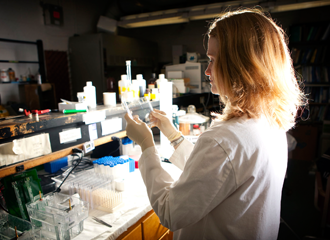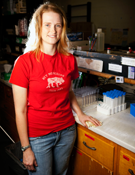Miranda Lange
Ph.D. Student
By Sarah Vos
photos by Mark Cornelison
On a recent Monday afternoon, Miranda Lange filled four small dishes, each containing a small rectangle of paper, with a buffer solution and set them on a rocking platform to gently wash an antibody away. The papers, really a membrane of mesh-like nitrocellulose, were covered with proteins extracted from the brains of transgenic mice, some of which have the mouse-equivalent of Alzheimer disease.
When the experiment is finished, Lange, using sophisticated proteomics methods, should be able to identify which of the brain proteins have suffered the most from oxidization. And in the case of the Alzheimer’s brain, oxidation is bad.
 Lange, a fourth year graduate student at the University of Kentucky, has worked mainly on projects involving Alzheimer’s. In a previous project, she examined a lipid in brain synaptosomal membranes called phosphatidylserine. “We wanted to find out whether this lipid was significantly disrupted in Alzheimer’s, and at what point,” she said.
Lange, a fourth year graduate student at the University of Kentucky, has worked mainly on projects involving Alzheimer’s. In a previous project, she examined a lipid in brain synaptosomal membranes called phosphatidylserine. “We wanted to find out whether this lipid was significantly disrupted in Alzheimer’s, and at what point,” she said.
Usually, phosphatidylserine lies on the inside of the cell, but when a cell starts to die, it “flips” to the outside, signaling the body what’s happening. “It’s like a beacon,” Lange explained.
In that experiment, Lange found that even in the brains of patients diagnosed with amnestic mild-cognitive impairment, arguably the earliest stage of Alzheimer’s, phosphatidylserine was significantly exposed to the outside of the cell membrane, signaling widespread brain cell death. The experiment showed that the “brain is starting to die long before even the diagnosis of early Alzheimer’s,” Lange said.
This type of discovery may eventually help researchers figure out how to slow down the progression of the disease or, hopefully, even cure it, said professor D. Allan Butterfield, who runs the labs.
Two post-doctoral scholars, five Ph.D.-track graduate students (one of whom is Lange) and two undergraduates conduct research in Butterfield’s labs. Most of the work is focused on Alzheimer’s and is funded by the National Institutes of Health. But Butterfield’s students have also looked at other neurodegenerative conditions, like Parkinson’s and Huntington’s diseases.
In the most recent issue of the Journal of Alzheimer’s Disease, Butterfield was named the 39th most important researcher in Alzheimer’s disease in the world for the contributions he’s made to understanding how the disease works. (William R. Markesbery, director of the UK Sanders-Brown Center on Aging was named the 23rd most important researcher worldwide.)
“This recognition is due entirely to the outstanding nature of the NIH-funded research of the graduate students and post docs and undergrads who have studied in my labs and the great collaboration with people in the UK Sanders-Brown Center on Aging, the Department of Molecular Pharmacology, and the Graduate Center for Toxicology,” Butterfield said.
 Lange, who grew up in Platteville, Wis., attributes her interest in chemistry to her father, who is a livestock nutritionist and produces mineral supplements for livestock. He doesn’t have a college degree, but he had an interest in chemistry and biology and always wanted to know how things worked. Lange says she takes after him.
Lange, who grew up in Platteville, Wis., attributes her interest in chemistry to her father, who is a livestock nutritionist and produces mineral supplements for livestock. He doesn’t have a college degree, but he had an interest in chemistry and biology and always wanted to know how things worked. Lange says she takes after him.
“I like to know how the body works,” she said, “how you think, why you think, what electron made you think that.”
The brain has fascinated Lange since high school, but she isn’t sure why. “To me, the brain is like the last frontier of the body,” she said. “They’re still not sure why it does some of the things it does.”
Lange started her academic career at the University of Wisconsin-Eau Claire as a chemistry major, but she quickly figured out that she preferred biological chemistry.
She spent the summer after her freshman year at UK taking a summer organic chemistry course and observing UK’s labs, where, at the time, her eldest sister, Chava Pocernich, was a Ph.D. student in Butterfield’s lab. She enjoyed the friendly, yet focused, atmosphere of the lab, as well as Lexington—but most importantly, she had a passion for studying the chemistry of the brain.
As her sister did before, Lange is now finishing her doctorate at UK under Butterfield’s guidance. She would relish the opportunity to become a full-time researcher at an academic institution or the National Institutes of Health. She wants to continue her work on the brain and continue to figure out what’s going on inside.
“I like hiding in a lab all day, solving puzzles of the brain.”


